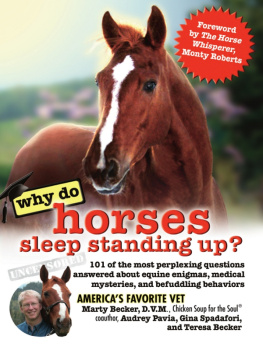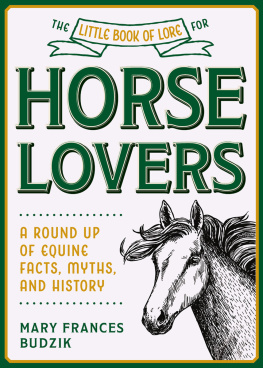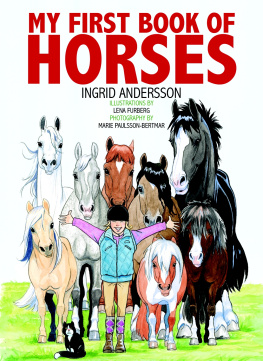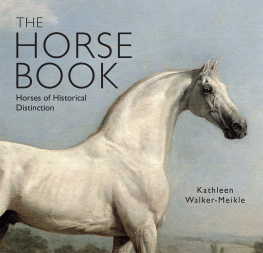why do horses sleep standing up?
why do horses
sleep standing up ?
101 of the Most Perplexing Questions
Answered About Equine Enigmas,
Medical Mysteries, and Befuddling Behaviors
Marty Becker, DVM
Audrey Pavia
Gina Spadafori
Teresa Becker

Health Communications, Inc.
Deerfield Beach, Florida
www.hcibooks.com
Library of Congress Cataloging-in-Publication Data
Why do horses sleep standing up? : 101 of the most perplexing questions answered about equine enigmas, medical mysteries, & befuddling behaviors / Marty Becker... [et al.] .
p. cm.
eISBN-13: 978-0-7573-9861-2 eISBN-10: 0-7573-9861-8
1. HorsesMiscellanea. I. Becker, Marty, 1954
SF285.W636 2007
636.1dc22
2007020558
2007 Marty Becker, Audrey Pavia, Gina Spadafori, and Teresa Becker
All rights reserved. Printed in the United States of America. No part of this publication may be reproduced, stored in a retrieval system or transmitted in any form or by any means, electronic, mechanical, photocopying, recording, or otherwise without the written permission of the publisher.
HCI, its logos and marks are trademarks of
Health Communications, Inc.
Publisher: Health Communications, Inc.
3201 S.W. 15th Street
Deerfield Beach, FL 334428190
Interior photos Photos.com, PhotoDisc
Cover design by Larissa Hise Henoch
Interior book design by Lawna Patterson Oldfield
Dedicated to the memory
of Barbaro, who showed us the
heart-pounding joy of victory,
the heartwarming spirit of hope,
and the heartbreaking
sadness of loss.
And in honor of Gretchen Jackson,
one of Barbaros owners,
who put that loss in greater context
for us all, reminding us, always,
that grief is the price of love.
Contents
Introduction
Do horses prefer some people over others?
Are horses prejudiced?
How do you know what kind of bit to use on a horse?
What is the difference between a hard-mouthed and soft-mouthed horse?
Why did people start riding sidesaddle?
Why do some do it now?
Is it true that a horses hoof is really his middle finger (or toe)?
Where did the other toes go?
I once heard that all racehorses are born on January
How is that possible?
Why cant they save horses who break a leg?
Why cant they just put a cast on it?
Do you guys ever get tired of giving advice on animals every day of your lives until the end of time?
W ithout the contribution of horses, you wouldnt be reading this book.
While the closest many of us get to a horse today is watching the Kentucky Derby or seeing a police horse do crowd control at a sporting event, the fact is that human civilization wouldnt have gotten very far without the contributions of the horse. Theyve done everything weve asked of them: served as beasts of burden, transportation, warrior, entertainer, and even, in some places, as dinner.
Now, of course, horses fill a role thats mostly recreational. Racehorses, show horses, trail partners, or oversized pasture ornaments: today we dont need horses to survive, but we still want them around. Perhaps this is because something in us always has and always will need what the horse symbolizes: freedom, beauty, strength, and speed.
Our past with horses hasnt always been advantageous from the horses point of view. Horse training was more about breaking the animal, bending him to our will without regard to his needs and desires.
So much has changed and is continuing to change.
These days, training is increasingly about getting a horse to work with us instead of for us, and that takes knowledge, not just of what a horse can do and be made to do, but how a horse thinks and can learn to trust us. Its all about learning from the horse, listening to the horse, and moving forward togetherabout joining up, as I like to say.
My goal in life has always been to leave the world a better place than I found it, for horses and for people, too. The authors of this bookan award-winning team of horse lovers and expertsfeel the same way. Thats why I am happy to encourage you to settle in and enjoy the pages to follow.
Youll learn more about horses than you ever imagined possible, and youll gain a better understanding and respect for one of humankinds oldest and most important partners. Join up, listen, learn, and have a laugh or two along the way. Lifes a great ride, and we have horses to thank for it.
Monty Roberts
Author of New York Times bestseller
The Man Who Listens to Horses
www.montyroberts.com
N ot that long ago, you had no choice but to get along with horses. They pulled streetcars and carriages through our cities, took our young men and their munitions to war, pulled our plows and drays, and raced for our amusement. Every day, in every way, we relied on the horse. Whether you lived on a farm or in a city, chances are you saw horses every day.
Not so today, of course. Ever since we traded in the horse for the internal combustion engine, having a horse around is more of a luxury than a necessity. And yet, we just cant seem to get them out of our system.
Perhaps its because theyve been in our lives for so long. Our everyday language is packed with sayings that originate from horse lore: long in the tooth, getting a leg up, and many more. We even measure the power of the machines that replaced them in their namesake, with engines compared by horsepower, not oxpower or even manpower.
Or perhaps theres more to the story, to our seemingly eternal fascination with and connection to the horse. We are in awe of the horse, his beauty, speed, and strength. We marvel at his willingness to submit all of his gifts to our wishes and yet always remain true to himself. There is always something wild and free in every horse, and that surely appeals to us as well.
With this book we share our love of horses and our heartfelt desire to celebrate a bond that goes back through all recorded history. And we share, too, our love of sharing knowledge in a way that both entertains and informs.
Saddle up and read on. Were glad youre with us on this ride.
Dr. Marty Becker, Audrey Pavia,
Gina Spadafori, and Teresa Becker
Q:
A:In the wild, when startled or alarmed, animals survive through the fight-or-flight response. This is the same response that kicks in when someone jumps out from the dark and scares you: do you throw up your hands to fight, or do you engage your feet and take flight? Humans, who have been called the ultimate predators, often fight. Horses, who are in almost all situations prey (except for fights between horses), take flight.
By natural selection, horses who could sleep standing up, wake up, and run away from predators faster were the ones more likely to survive and pass on their genes. Put another way: when youre a large herbivore, and a carnivore with a rumbling stomach looks your way, youre better off if you can move at a moments notice.
So thats why horses sleep standing up, but how do they do it? The answer is called a stay apparatus, which is a unique adaptation of the musculoskeletal system of the horse that allows the animal to lock limbs in position so that very little muscle function is required to remain standing.
In the front legs, this is relatively easy, since these limbs naturally rest in a straight, load-bearing position. The hind legs presented a bigger challenge, however, and for them, horses have over time developed a combination of ligament and joint adaptations that allow them to lock two principle joints, the stifle and the hock, in a fixed and immovable position.
Next page











